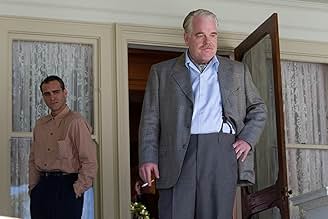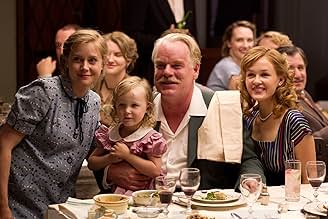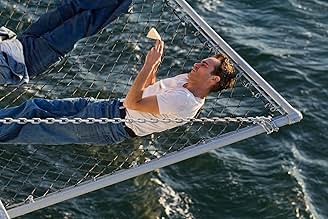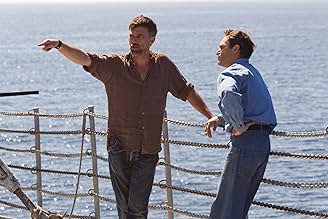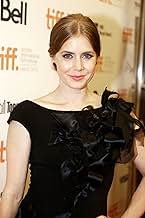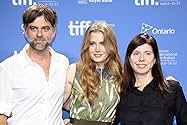Um veterano da Marinha chega em casa da guerra inseguro e incerto sobre seu futuro - até ter contato com a Causa e seu líder carismático.Um veterano da Marinha chega em casa da guerra inseguro e incerto sobre seu futuro - até ter contato com a Causa e seu líder carismático.Um veterano da Marinha chega em casa da guerra inseguro e incerto sobre seu futuro - até ter contato com a Causa e seu líder carismático.
- Direção
- Roteirista
- Artistas
- Indicado a 3 Oscars
- 75 vitórias e 187 indicações no total
Patrick Wilder
- V.A. Patient
- (as Patrick Biggs)
Avaliações em destaque
Yes, herein contains some of the most ravishing filmmaking of the new millennium. The period details are abstract yet precise. The score has a stark, primordial allure. It's post-WWII America: Psychologically scarred veterans attempt to cramp themselves back into society. One is loner Freddie Quell, adrift in emotional confusion. He's secured a gig as a portrait photographer at a lavish department store imagined like a temple of indulgent commercialism. But Freddie doesn't last long there. In the darkroom, he screws models and chugs rotgut he makes with photo chemicals. Ultimately, he loses it on a customer, not just hitting him but harassing and lambasting him, working out some indecipherable, irrepressible rage.
Phoenix's performance as Freddie reduces all he's done before to a preparation exercise. He longs for something, but even he can't tell you what, and that sorrow has clotted into self- destructive ritual. We see his snarly face from angles we haven't seen before. We're not sure if his leery eyes are hateful or if he's dead inside. He's a captivating animal.
Then he meets stout, articulate Lancaster Dodd, always circled by people who treat him like a prodigy, hanging on his every word, laughing at all his mugging. Lancaster fancies himself a renaissance man. He's married to Peggy, who's much more vigilant than we first think. His son trails the proceedings with a dormant pose of derision. His daughter marries a man who, like everyone else in their clique, views him as a wizard.
The film belongs to Phoenix, but Hoffman more than does his thing, his affectations ringing with conceit and fraudulence. Freddie---father dead, mother institutionalized---is naturally drawn to Dodd, who promises answers, mental freedom, happiness, even claims to cure leukemia. He's written a book his bootlickers treat as a sort of bible. He loves to charm and perform.
It's well-known that Lancaster's cult is inspired by L. Ron Hubbard's Scientology. It's not direct, but the manner in which Lancaster draws Freddie into the fold, among other things, is unmistakably influenced by the contentious institution and Hubbard's life. Paul Thomas Anderson doesn't bind to that inspiration for his movie...but he doesn't bind to anything, really. You walk out muddled, wearied, wondering where to start in connecting the dots in this elegant, arresting movie. The story is as confounding as its technique is magnificent.
Anderson, the true wunderkind of the Tarantino generation, sets everything up so beautifully, you wait for the turning point to prevail so the intrigue can come to boil. Instead, nothing progresses. The dramatic developments seem to dwindle and become less consistent as the movie drifts along, and Anderson throws in pauses, like a lingering desert scene or an outstretched montage in which Freddie is made to pace in a room, that slow the movie to a drudge. Freddie's sex preoccupation, which was stressed in the film's early stretch, grows dissonant. It's less about narrative arc and more the emotional condition of two men, a twist of trust and mistrust, id and superego. PTA's vision is grand in scope, but his result is not so much ambiguous as opaque and detached.
For the first time in his immaculate career, the greatest filmmaker of his generation seems to languish. His newfound frigidness makes the film easy to admire but difficult to love. Anderson is so stunningly impressive, in fact, that it's taken me two viewings of The Master to admit all this to myself. Understandably, some critics have patronized it as deliberately evasive and occult, but isn't that just double-talk? A glorification of an artist's failure to proportionately bear his ideas? Something particularly intriguing is how the movie poses questions not so much about the importance of faith, but how far the human limit for change can extend and to confront emotional devastation so heavy it can never recover. But the film is too ambivalent or cautious to probe them in depth. By the end, it's become an opaque challenge between two phenomenal actors whose commitment to their roles is awe-inspiring, but it's manacled to a work so in awe of itself, the audience gets blockaded.
Phoenix's performance as Freddie reduces all he's done before to a preparation exercise. He longs for something, but even he can't tell you what, and that sorrow has clotted into self- destructive ritual. We see his snarly face from angles we haven't seen before. We're not sure if his leery eyes are hateful or if he's dead inside. He's a captivating animal.
Then he meets stout, articulate Lancaster Dodd, always circled by people who treat him like a prodigy, hanging on his every word, laughing at all his mugging. Lancaster fancies himself a renaissance man. He's married to Peggy, who's much more vigilant than we first think. His son trails the proceedings with a dormant pose of derision. His daughter marries a man who, like everyone else in their clique, views him as a wizard.
The film belongs to Phoenix, but Hoffman more than does his thing, his affectations ringing with conceit and fraudulence. Freddie---father dead, mother institutionalized---is naturally drawn to Dodd, who promises answers, mental freedom, happiness, even claims to cure leukemia. He's written a book his bootlickers treat as a sort of bible. He loves to charm and perform.
It's well-known that Lancaster's cult is inspired by L. Ron Hubbard's Scientology. It's not direct, but the manner in which Lancaster draws Freddie into the fold, among other things, is unmistakably influenced by the contentious institution and Hubbard's life. Paul Thomas Anderson doesn't bind to that inspiration for his movie...but he doesn't bind to anything, really. You walk out muddled, wearied, wondering where to start in connecting the dots in this elegant, arresting movie. The story is as confounding as its technique is magnificent.
Anderson, the true wunderkind of the Tarantino generation, sets everything up so beautifully, you wait for the turning point to prevail so the intrigue can come to boil. Instead, nothing progresses. The dramatic developments seem to dwindle and become less consistent as the movie drifts along, and Anderson throws in pauses, like a lingering desert scene or an outstretched montage in which Freddie is made to pace in a room, that slow the movie to a drudge. Freddie's sex preoccupation, which was stressed in the film's early stretch, grows dissonant. It's less about narrative arc and more the emotional condition of two men, a twist of trust and mistrust, id and superego. PTA's vision is grand in scope, but his result is not so much ambiguous as opaque and detached.
For the first time in his immaculate career, the greatest filmmaker of his generation seems to languish. His newfound frigidness makes the film easy to admire but difficult to love. Anderson is so stunningly impressive, in fact, that it's taken me two viewings of The Master to admit all this to myself. Understandably, some critics have patronized it as deliberately evasive and occult, but isn't that just double-talk? A glorification of an artist's failure to proportionately bear his ideas? Something particularly intriguing is how the movie poses questions not so much about the importance of faith, but how far the human limit for change can extend and to confront emotional devastation so heavy it can never recover. But the film is too ambivalent or cautious to probe them in depth. By the end, it's become an opaque challenge between two phenomenal actors whose commitment to their roles is awe-inspiring, but it's manacled to a work so in awe of itself, the audience gets blockaded.
I came into The Master knowing almost nothing about it and, knowing (and caring) almost nothing about Scientology, it transpires that I may not have been able to take as much from it as someone going in fully informed and ready to be led by the director. I say this upfront because I have noticed that generally, criticism of this film tends to be met with a snobby dismissal of the individual who didn't "get it" because they weren't smart enough etc. This said, the film started well and it engaged me for well over the first half, building characters and exploring them in a patience rhythmic manner that mirrors the hypnotic delivery of Dodd himself. Sadly this build doesn't have a delivery to speak of and in the second half of the film it really did lose me.
What else it lost was any direction and sense of momentum that it may have had up till that point. The story doesn't go anywhere and it takes its time doing it, meandering through similar ground and offering nothing to really justify the long running time. Some may chose to see this as people complaining about a lack of action etc (again, that snobby of assuming such comments must mean "I need a car chase") but this isn't it at all; the story-telling seems to fall way down a priority list and it is a real shame because so much else about the film is excellent.
The first thing that grabs you is visually how stunning the film is – and it is a factor that remains consistent across the whole film. The colors, the framing and the size of the images are alluring and engaging. I had not heard of Malaimare before seeing his name in the credits, but his work here is terrific. On top of these images we get great use of music that is like a bedding rather than being stuck on top. It is hard to describe but it works very well, spilling under scene after scene and giving the delivery an oddly engaging feel and tone. As everyone has already said, the film is carried with some very strong performances. Phoenix is really great, with ragged edges and internals on display. Hoffman is more patient but also prone to rage when questioned and he balances this well. Adams surprised me the most as I think I didn't expect her to be as good as she was. The three of them (but mostly the lead two) make the film much better by virtue of what they do – and it is just a shame that the story-telling isn't better for them.
Indeed this is true for me of everything, because the film is so well made, looks so beautiful and is a great piece of crafting that it really is such a shame to be left cold by it and to feel it meandering without any momentum or reason. It is a great film and it deserves to be seen for what it does so very well, but in no way is it a good story – and it is this aspect that really lets it down.
What else it lost was any direction and sense of momentum that it may have had up till that point. The story doesn't go anywhere and it takes its time doing it, meandering through similar ground and offering nothing to really justify the long running time. Some may chose to see this as people complaining about a lack of action etc (again, that snobby of assuming such comments must mean "I need a car chase") but this isn't it at all; the story-telling seems to fall way down a priority list and it is a real shame because so much else about the film is excellent.
The first thing that grabs you is visually how stunning the film is – and it is a factor that remains consistent across the whole film. The colors, the framing and the size of the images are alluring and engaging. I had not heard of Malaimare before seeing his name in the credits, but his work here is terrific. On top of these images we get great use of music that is like a bedding rather than being stuck on top. It is hard to describe but it works very well, spilling under scene after scene and giving the delivery an oddly engaging feel and tone. As everyone has already said, the film is carried with some very strong performances. Phoenix is really great, with ragged edges and internals on display. Hoffman is more patient but also prone to rage when questioned and he balances this well. Adams surprised me the most as I think I didn't expect her to be as good as she was. The three of them (but mostly the lead two) make the film much better by virtue of what they do – and it is just a shame that the story-telling isn't better for them.
Indeed this is true for me of everything, because the film is so well made, looks so beautiful and is a great piece of crafting that it really is such a shame to be left cold by it and to feel it meandering without any momentum or reason. It is a great film and it deserves to be seen for what it does so very well, but in no way is it a good story – and it is this aspect that really lets it down.
I had no clue what I was heading into when I pressed play. I think it's really hard to make a bad movie when you have Philip Seymour Hoffman, Jaoquin Phoenix, Amy Adams, and Jesse Plemons leading the charge. Hoffman and Phoenix are fully absorbed into their characters and the film forces its audience to try and follow these conversations that somehow feel super grounded (due to Hoffman's amazing delivery) and unsettling at the same time. This movie really could not have worked without the talent of these actors.
Amy Adams does so much with so little screen time; I do wish we got more time with her but I think her lack of presence contributes to the messaging of the film. She gives an extremely pulled back/subtle performance of a woman that is truly in the middle of the storm.
This feels fresh and distinct from any other movie I've watched, so I'd definitely recommend it.
Amy Adams does so much with so little screen time; I do wish we got more time with her but I think her lack of presence contributes to the messaging of the film. She gives an extremely pulled back/subtle performance of a woman that is truly in the middle of the storm.
This feels fresh and distinct from any other movie I've watched, so I'd definitely recommend it.
I will never understand how Phoenix and Hoffman didn't win the Oscars. Specially Joaquin, I truly think it is the best actor performance I ever watched in my life. The movie is great, although is not for everyone, you must watch it with the right mindset and pay attention to every detail. Most new actors should watch this movie to take notes on how to be a better actor. Cheers.
My Rating : 8/10
Inspired by Scientology founder L. Ron Hubbard and the development of a cult, 'The Master' is a drama-piece through and through.
The movie doesn't have a message or goal as such and sort of does it's own thing.
The things worth watching are the terrific performances, weird content and some very fine cinematography.
Inspired by Scientology founder L. Ron Hubbard and the development of a cult, 'The Master' is a drama-piece through and through.
The movie doesn't have a message or goal as such and sort of does it's own thing.
The things worth watching are the terrific performances, weird content and some very fine cinematography.
Você sabia?
- CuriosidadesDuring the jail cell scene, Joaquin Phoenix breaks a real toilet. His actions were entirely improvised. Due to the historical past of the building where the scene took place, the toilet was considered "historical." Joaquin had no intentions to break the toilet, nor did he think it was possible.
- Erros de gravaçãoIn the "pacing" scene, as Quell goes from wooden paneled wall to window and back, the second time he goes to he wooden paneling, he breaks out a panel when he pounds it with rage. In the numerous successive shots, the wood panel is restored.
- Citações
Lancaster Dodd: If you figure a way to live without serving a master, any master, then let the rest of us know, will you? For you'd be the first person in the history of the world.
- Cenas durante ou pós-créditosAfter its title, this film has no further opening credits.
- ConexõesEdited into Conspiracy: The Hollywood Syndicate (2015)
- Trilhas sonorasBaton Sparks
From '48 Reponses to Polymorphia'
Written by Jonny Greenwood
Performed by The Aukso Chamber Orchestra
Courtesy of Unreliable Ltd.
Principais escolhas
Faça login para avaliar e ver a lista de recomendações personalizadas
- How long is The Master?Fornecido pela Alexa
Detalhes
- Data de lançamento
- País de origem
- Idiomas
- Também conhecido como
- The Master: Todo Hombre Necesita Un Guía
- Locações de filme
- Mare Island, Vallejo, Califórnia, EUA(as Philadelphia, Pennsylvania and various houses, a park and the docks)
- Empresas de produção
- Consulte mais créditos da empresa na IMDbPro
Bilheteria
- Orçamento
- US$ 32.000.000 (estimativa)
- Faturamento bruto nos EUA e Canadá
- US$ 16.377.274
- Fim de semana de estreia nos EUA e Canadá
- US$ 736.311
- 16 de set. de 2012
- Faturamento bruto mundial
- US$ 28.689.359
- Tempo de duração
- 2 h 18 min(138 min)
- Cor
- Mixagem de som
- Proporção
- 1.85 : 1
Contribua para esta página
Sugerir uma alteração ou adicionar conteúdo ausente







